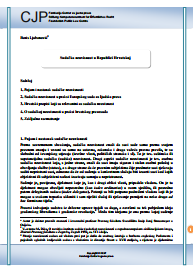Sudačka neovisnost u Republici Hrvatskoj
Judicial Independence in the Republic of Croatia
Author(s): Boris Ljubanović
Subject(s): Law, Constitution, Jurisprudence, Constitutional Law, Public Law, Evaluation research, EU-Legislation
Published by: Fondacija Centar za javno pravo
Keywords: Public law; constitution; judiciary; judges; independence; legislation; Republic of Croatia; evaluation; European court for human rights;
Summary/Abstract: According to modern conception judiciary independence means that judges judge pursuant only to their legal knowledge and tied only by the constitution, statutes and other applicable legal regulations. It also menas that judiciary needs to be kept away from any outside influence (executive power, political power etc). Personal independece of the judiciary means that judges have a safe and permanent personal position in the execution of his duties (status). It also means that impartial judges will resolve cases. Judges whose objective and/or subjective reasons raise doubt about their impartiality must be exempted. This paper displays Judgements and Decisions of the European Court of Human Rights concerning judiciary independence. It also examines Croatian constitutional and legal provisions for enforcement of judiciary independence, with emphasis on rules that regulates appointment, dismissal and professional career advancement of the judges, and exposes about evaluation of judges and presidents of the courts in the Republic of Croatia. That evaluation is given, according to criteria conferred by law, by the specially formed courts chambers, and argues about stricter requirements for appointments of judges of the first instance courts and about judiciary independence in the practice of the Croatian system of justice.
Series: CENTAR za JAVNO PRAVO — Projekti
- Page Count: 12
- Publication Year: 2013
- Language: Croatian
- Content File-PDF

